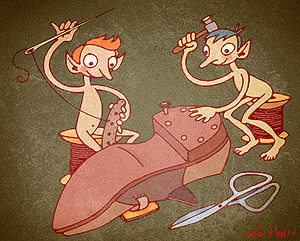Here's a scenario from Garrett Cullity's article "Moral Free Riding"--
The Enterprising Elves
On the first day in my newly carpeted house, I leave my shoes outside. In the morning I am delighted to find they have been extraordinarily well repaired. I am less delighted when I receive the bill. (p. 10)
This is supposed to be the same type of situation as Robert Nozick's radio thought experiment, which is meant to show there's not always an obligation to pay for benefits nonvoluntarily received.
I say "Right" about this scenario--I don't have to pay the elves--but it seems to me that outright requesting benefits is more than what's needed for there to be an obligation to pay. Consider this continuation of the story of the elves:
The Enterprising Elves and the Cancelled Cobbler
After putting on my shoes and tossing out the bill, I stroll to my cobbler's shop and cancel my monthly shoe repair appointment.
That seems to change things. If I were indifferent to the elves' services and had no monthly plan with the cobbler, I could indeed toss out the bill and never look back. But in fact I welcome their services. Now at this point in the story, it's hard to say I have to pay for the elves' work. Should I pay the elves even though they invaded my cobbler's turf? Should I pay my cobbler, even though he didn't repair my shoes? But consider this:
The Elves Come Back
A month has passed and as usual I leave my shoes outside my door. The elves once again repair my shoes. I no longer have a standing appointment with my cobbler. Once again I toss out the bill.
To my my mind, now the unrequested repairs do have to be paid for. True, I didn't request the repairs, but I welcomed them and my behavior shows I'm counting on the elves to show up. If I'd really wanted to avoid the obligation to pay the elves, I would have had to keep my shoes inside. If I couldn't do that--remember the carpets--then I needed to show I was not counting on the elves by maintaining my appointments with the cobbler and paying his bills. But it just can't be that I may continue to receive the repairs, having arranged my life accordingly, but I don't have to pay for them.
Extrapolation to vaccination ethics ... well, long story. We'll save that for another day.


2 comments:
So let's say I put up solar panels on my roof. My neighbor's tree partially shades the panels, and I knew that this would be the case, but I put up the panels anyways, thinking the small amount of electricity is going to be better than nothing. But then my neighbor chops down the tree. I suddenly am receiving a lot of more power, and I re-arrange my life accordingly. Then my neighbor comes by and tells me that the only reason he cut down his favorite tree was so that I could get more power, and that he was banking on the extra power that I'm generating to off-set his utility cost by having me pay him the difference in my now lower electric bill. Am I obligated to pay my neighbor for the extra power that I get?
So I'm getting a benefit that was unasked for, but now expect and the person who provided me that benefit is asking for compensation. Is this a free ride?
Love the example--thanks for that. Will go give it some thought while doing some errands!
Post a Comment